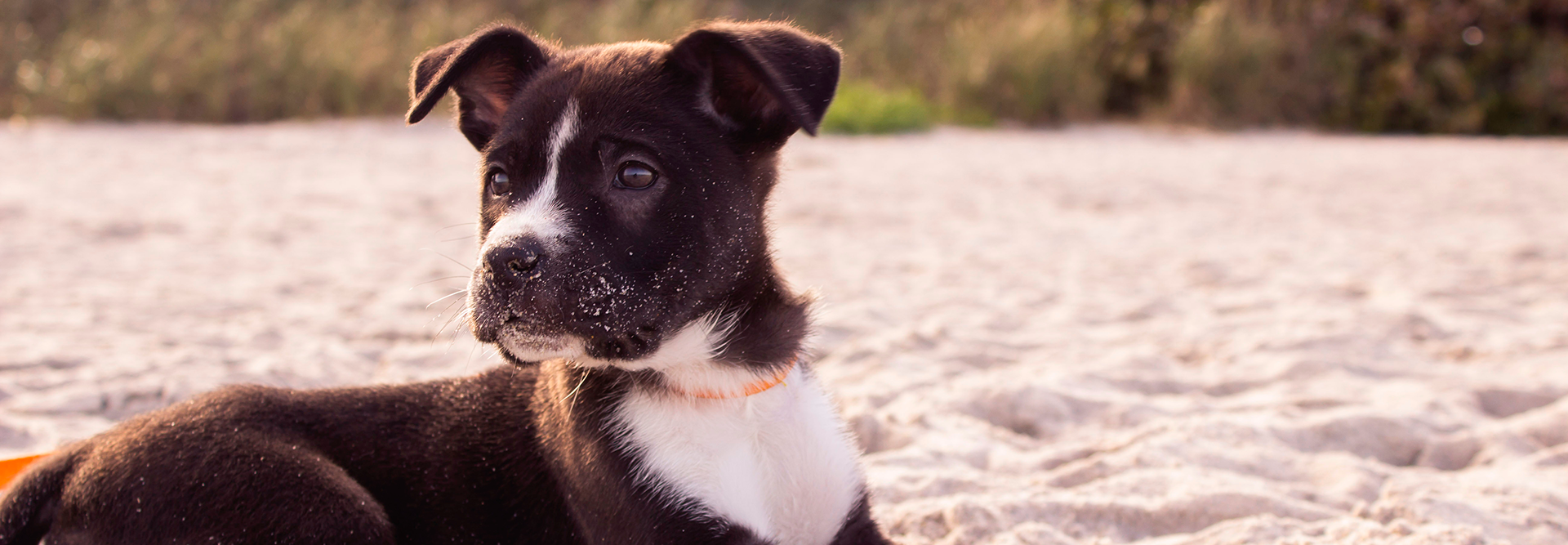
Eating is a big part of your puppy’s health and development. From the time puppies are born, they receive nutrients and vitamins from their mother’s milk and gradually transition to softer foods. Depending on their age and breed, there comes a point when your puppy needs to switch over to solid foods. This process, known […]
Eating is a big part of your puppy’s health and development. From the time puppies are born, they receive nutrients and vitamins from their mother’s milk and gradually transition to softer foods. Depending on their age and breed, there comes a point when your puppy needs to switch over to solid foods. This process, known as weaning, should start at around the three to six-week age period but some litters need a little push—with your help!
Here are a few tips on how you can train your puppy to start eating solid foods.
Pick out dry dog food that fits well with puppies. We’ve mentioned this various times in previous blogs, but the core message still rings true: healthy nutrition is key. Your puppy’s food should contain many nutrients, vitamins, and minerals that’ll help your puppy’s growth and development. Nutritious dog food shouldn’t contain a large number of fats, sugar, or carbohydrates. If your puppy’s dog food has a large list of ingredients, one word: stay far away. Choosing the best dry dog food for your puppy is the best investment you can make. After you choose good dry food, select a small dog bowl and place a small amount of dog food in it. Do not allow your puppy to eat it yet. There will be more time for that in the later steps!
Once you have the small bowl of dog food, pour a small amount of water into it. Make sure the water is warm and let the food soak it up. Your puppy’s food should look like mush. Yes, we know. It’s not very appetizing to us but it’ll help your puppy grow used to their new food. If your puppy is still drinking milk from its mother, you can also mix a little bit of puppy milk replacer into the bowl. If your puppy doesn’t enjoy the mush, try adding wet dog food to give it that extra taste. Some puppies are extra picky with their food so don’t be afraid to try a combination of these ingredients.
Make sure your puppy hasn’t been around its mother for a few hours. That way, they’ll be receptive to the food you’re giving them. Place the bowl in front of them and encourage them to eat everything that’s in it. If your puppy doesn’t seem too interested in what’s inside the bowl, don’t give up! Dip your fingers into the bowl and smear some of the mush around their lips so they can taste it. Be sure it doesn’t stick to your puppy’s nose! You can also hand-feed some of the mush to your puppy. Give this mixture for the next couple of days. After your puppy eats, PetMD recommends allowing the puppy’s mother to lick the bowl and the puppy clean (if applicable).
After at least 3 days have passed, your puppy should be eating the mush without hesitation. Remember to let the water soak the food as much as possible. Solid food can cause the puppy to choke, especially during the beginning of the transition phase. If your puppy is eating the mush to its heart’s content, it’s time to take things one step further. Every week, gradually decrease the amount of water you add to the dry dog food. By week 3, there should be more dryness to the dog food. When you keep this routine consistently, your puppy’s food should be 100% solid by the time they reach 7 or 8 weeks of age. Pay attention to your puppy’s eating habits too. Are they eating their food normally or do they still seem hesitant to eat? Based on their behavior, you can choose how quickly you decrease the amount of water you add to the food. For example, instead of decreasing the amount every week, you can do it every three days, especially if your puppy is enjoying their food.
Puppies thrive with routines. As humans, it’s in their nature so it’s important for their owners to meet their expectations. Talk with your vet about your puppy’s nutrition and the number of times you need to feed them. After that, pick a feeding schedule that you and your puppy follow every day. Try to feed your puppy at the same times daily, such as morning, afternoon, and evening. Many vets will recommend feeding your puppy at least twice a day. With a consistent schedule, your puppy will learn how to eat solid food quickly.
The weaning process is an important stage of every puppy’s development so…please be patient! Your puppy is learning how to eat proper food for the first time. It can be a confusing experience for them and they may feel grossed out over what you’re putting in their food bowl. Be persistent and continue feeding your puppy the mush food. Remember: dogs can’t exactly starve themselves. Sooner or later, they’ll give in and eat what you give them. By the time they are 8 weeks old, your puppy will be accustomed to eating dry dog food and other treats. We hope this list helps you teach your puppy to eat solid food!